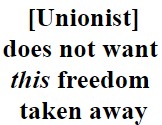So why is it that the General Council partly does not want to give a clear answer to the question of whether it excludes all non-Lutherans from its altars and pulpits, partly only too clearly to understand that it does not want to let this freedom be taken away from it, also with errorists, also with members of sects, depending on the circumstances, to cultivate altar and pulpit fellowship? This cannot possibly be a mere inconsistency. Rather, it is evidently due to the unionist spirit that still dominates this body, to the unionist leaven of our time, which it has not yet swept out of itself. The Council, however, wants to hold fast to the doctrine of our Church — although, as can be seen, among other things, from the tolerated chiliasm of its outstanding members, this too in a very modified way — but, like the other American sects, to their own, as to a doctrine which they prefer, not as to the exclusively true one. The Council wants to hold on to the separate existence of our church, but, like the other American sects, to their separate church fellowship, as to the church to which they give preference, not as to the true visible church of God on earth in an unrestricted sense of the word. In fact, the Council rejects the doctrine that in a church there should and can be unity of its members and even of its preachers in all articles of faith. By that the Council rejects that the Lutheran Church has the right of a separate existence. In fact, the Council declares that it was a sinful schism when the Lutheran Church separated from Rome, Zurich and Geneva and erected its separate altars and pulpits to them. The Council is evidently, whether consciously or unconsciously, still caught up in the American view that all fellowships which do not reject the primary fundamental articles of the Christian faith in thesi belong to the orthodox denominations, with whose members one can under certain circumstances, especially if they are not hostile to the teachings of our Church, maintain altar and pulpit, i.e. ecclesiastical, fellowship. The Council still regards confessional exclusivity with the local dissenters [Pastor Brobst] as something sectarian. The Council does not want to sacrifice its reputation of being mildly evangelical, liberal and noble to its Lutheranism. In short, the Council does not want to be a new resurrection of the old Lutheran Church of the sixteenth and seventeenth centuries, which was serious about its confession in doctrine and practice, but a new Lutheran Church transformed according to the demands of its time and its country, liberal towards the erring.
Thus, at the beginning of this new volume of the present theological publication [Lehre und Wehre], we must declare that it, as a servant of the Evangelical Lutheran Church, the true visible Church of God on earth, must go forth on the path it has taken from the beginning and cannot become the organ of a (page 11) movement which in fact denies that our church is not a sect, not an erring fellowship, not a church party, but the true visible church of Christ on earth, a movement which already stamps the original Lutheran church as a schismatic one by deed, and under the name and banner of the same has set itself the goal of producing a new church of a different spirit. Our church has chosen the Holy Scriptures as the ground on which it stands, and on this it really and truly stands; from this ground it does not depart even one finger’s breadth ("vel transversum, ut ajunt, unguem"); this is its character, this is its task, this is its blessing for all Christendom, this is its crown, which it will not and cannot let itself be robbed of. If the Church has ever had cause, if she did not want to give herself up, to watch earnestly lest a unionistic spirit should creep in among her, the Church has even more cause for this now, for it is only too evident that Satan, after he has not been victorious in his battle of destruction against the Church through rationalism, has chosen unionism as his last strategic means, and by this means has already handed over whole large Church fellowships finally to the complete unbelief of this last time as its prisoners. True union is indeed the shining goal which Christ has set for His Church for all time, but as long as there is a true Lutheran Church, this goal has already been reached, for the true union is none other than the true Evangelical Lutheran Church. It is this Union that our Lehre und Wehre [Doctrine and Defense] has hitherto endeavored to serve; it is this Union, and this alone, that it intends to serve in the new volume beginning with this issue, so long as it is worthy of God to be in the service of His truth and Church. W. [C. F. W. Walther]



No comments:
Post a Comment
Comments only accepted when directly related to the post.